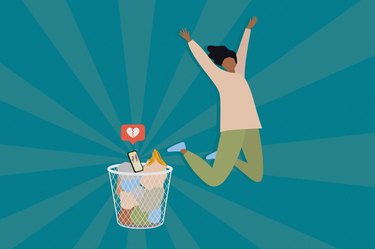
Here's a truth: No one's to-do list is done at the end of the day, every day. And while some people can shrug that off, others might experience guilt at a to-do list with most, some or nary an item checked off. If the latter describes you, you may be experiencing productivity guilt.
Discover key signs of productivity guilt — along with strategies you can put in place to overcome it.
Video of the Day
What Is Productivity Guilt?
Productivity guilt arises in more nuanced ways than just in relation to a to-do list.
"Productivity guilt occurs when you experience guilt in response to the number of tasks you complete or don't. It can be household duties, health and wellness goals, work — anything where you're putting forth effort," therapist and coach Sarah Bryski-Hamrick, who runs the Pennsylvania-based practice Teletherapy with Sarah, tells LIVESTRONG.com.
What makes productivity guilt so impactful is that you're not just distressed that you didn't get enough done but that there's something wrong with you for not doing it.
"That's what's so insidious about it," Bryski-Hamrick says. You might feel that what you do is never enough — and therefore, you're never enough.
Worth noting: You won't find productivity listed in the Diagnostic and Statistical Manual of Mental Disorders, Fifth Edition (DSM-5), which guides mental health professionals in making a diagnosis. But burnout — or chronic stress due to work — is listed in the World Health Organization's (WHO) 11th edition of the International Classification of Diseases (ICD-11), although not classified as a medical condition.
Signs of Productivity Guilt
Productivity guilt actually has little to do with the state of your to-do list. It really might be incomplete, but it might also have most things checked off. Still, these feeling may persist:
You regularly feel as if you're not doing enough.
At the end of the day, you feel a sense of guilt. "It may be difficult to pin down exactly why, but even if you do everything you set out to, you may still feel bad," Bryski-Hamrick says.
You constantly compare your ability to accomplish something with someone else's (friends, neighbors, colleagues or even total strangers on social media).
While productivity guilt shows up in personal and professional ways, know that your employer may have set us up for these feelings, Bryski-Hamrick says. "Workplaces across the country prioritize productivity and profit over people — and no field is immune to this. We are asked to do more than our bodies and minds are built for," she says. Over time, you may internalize this as your own drive to do more, and come to believe that your productivity is your worth. (It's not — and more on that later.)
Productivity guilt is also born out of hustle culture.
"Data shows we make less money than generations before us, despite buckets of student loan debt," Brystki-Hamrick says. Millennials have less wealth compared to Boomers when they were a similar age, per a February 2019 article from Pew Research, and three-quarters of Gen Zers say they're trying to earn more income — including turning a passion into a side gig, according to a summer 2022 Bank of America survey.
"Hustle culture takes that economic issue and turns it into an opportunity," Brystki-Hamrick says. When you're participating in hustle culture, the time after work when you're doing "nothing" is framed as an opportunity to do something productive and money-making with your time.
Why Productivity Guilt Is Harmful
Productivity guilt is not just a little remorse at not doing enough.
"It can make one's self-esteem or confidence suffer, or even worsen existing depression and anxiety. A high-stress, high-pressure work environment is known to have mental health symptoms manifest, even when you don't have a history of it," Bryski-Hamrick says.
The majority of people who experience on-the-job stress says it seeps into their personal lives, and some report coping with it by consuming more caffeine, smoking or drinking more alcohol, according to the Anxiety & Depression Association of America.
How to Overcome Productivity Guilt
The process of working through productivity guilt takes time, healing and unlearning previous behaviors, Bryski-Hamrick says. If you realize that this is unhealthy for you and you'd like to make a change, here are some steps to consider:
Unfollow people who ascribe to hustle culture in ways that are negative to you and instead follow those who prioritize wellness over productivity. Another option: Uninstall apps.
2. Seek Out Therapy
That can be with any licensed therapist that you trust and connect with, but if you're looking for someone new, there are many therapists who specialize in perfectionism, burnout or anti-hustle culture. If therapy is unaffordable, Bryski-Hamrick also recommends checking out Open Path Collective, a membership network that provides reduced-fee psychotherapy sessions.
3. Listen to Your Body
Pressures to be productive require you to ignore your needs in service of getting things done. But guess what: You do not have to power through your tasks no matter what.
Listen to your body throughout the day and try to honor what it needs, Bryski-Hamrick recommends. For example, if you feel back pain while sitting, stand up and stretch. If you're feeling overwhelmed, take a short break and head outside for a few minutes.
4. Learn to Say No
"Let's all just step away from being a 'yes' person, because you're not serving yourself if you're saying yes to everyone," Bryski-Hamrick says. This is more difficult than it looks, but there are several therapists on social media who promote drawing these types of boundaries (including setting boundaries with your parents) — and show you how.
5. Practice Self-Compassion
When you realize you're playing the comparison game, cut yourself some slack. "We are all so different with different bodies and energy levels. To think we can complete the same number of things in the same amount of time is unfair, wrong and not very kind," Bryski-Hamrick says.
6. Find the Fun
Rediscover non-work activities to do that feel good and are personally meaningful to you. Maybe it's hiking, reading cookbooks or simply sitting outside and breathing in fresh air. Whatever the activity may be, try not to attach goals or expectations to it beyond it bringing you happiness or a sense of contentment.
- World Health Organization: "Burn-out an "occupational phenomenon": International Classification of Diseases"
- Pew Research: "Millennial life: How young adulthood today compares with prior generations"
- Bank of America: "Gen Z’s Financial Priorities, Barriers & The Path Forward"
- Anxiety & Depression Association of America: "Highlights: Workplace Stress & Anxiety Disorders Survey"
Is this an emergency? If you are experiencing serious medical symptoms, please see the National Library of Medicine’s list of signs you need emergency medical attention or call 911.





